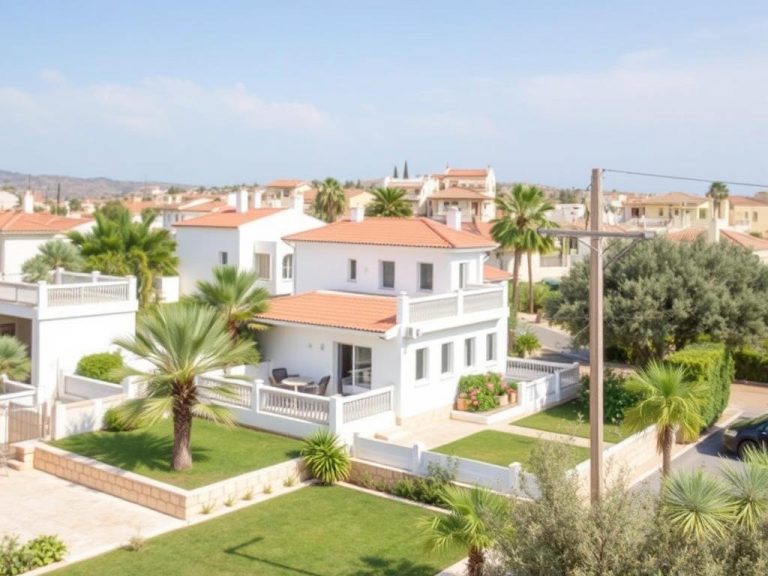Understanding Property Taxes in Cyprus: Complete Cost Breakdown
Investing in real estate in Cyprus has become increasingly popular due to the island’s favorable climate, strategic location, and attractive fiscal incentives. However, for anyone considering purchasing property or managing real estate investments there, understanding the various property taxes and associated costs is crucial. Navigating the financial landscape requires a clear comprehension of property taxes Cyprus imposes, including capital gains tax Cyprus, stamp duty Cyprus, and overall property ownership costs Cyprus. This article presents an exhaustive explanation of the various taxes and fees, along with how they impact owners, buyers, and investors alike.
The Framework of Property Taxes in Cyprus
The property tax system in Cyprus is a mix of direct and indirect taxes, designed to regulate and profit from real estate transactions and ownership. Historically, Cyprus had an annual property tax from 1980 until it was abolished in 2017. The abolition shifted more emphasis onto transaction-based taxes such as stamp duty and capital gains tax, along with municipal fees and duties related to property ownership.
Understanding the framework is essential because property taxes Cyprus can sometimes differ depending on the type of property, its value, and whether it is the primary residence or an investment asset. Foreign buyers and temporary residents should particularly be aware of these differences, as they may affect total costs significantly.
Despite the elimination of the annual property tax, Cyprus maintains various other taxes that significantly affect the total cost of property ownership and transfer.
Stamp Duty Cyprus: The Cost of Property Transfer
Stamp duty is the primary tax levied on the transfer of property ownership in Cyprus. It represents a fixed percentage fee calculated on the purchase price or the market value of the property, whichever is higher. This means that buyers should anticipate this duty as an essential cost during transaction completion.
The stamp duty rates in Cyprus are generally set at a tiered structure to accommodate transfers of various values.
| Property Value Bracket (€) | Stamp Duty Rate |
|---|---|
| Up to 85,000 | 0.15% |
| 85,001 – 170,000 | 0.20% |
| Over 170,000 | 0.25% |
However, for properties valued over €5 million, a flat rate of 0.30% applies. Moreover, if the property transfer involves a company that owns the property, additional considerations apply, but for standard private transactions, this remains the prevailing scale.
Stamp duty Cyprus is typically paid by the buyer, and it is payable within 30 days from the date of signing the contract of sale. Failure to comply results in penalties and interest on overdue amounts. The payment is made to the Department of Land and Surveys.
Stamp duty is an unavoidable transactional cost in Cyprus, but its relatively low rates make property transfers affordable compared to many European countries.
Capital Gains Tax Cyprus: Understanding Liability on Property Profits
Capital gains tax Cyprus applies to profits arising from the sale of immovable properties situated within Cyprus. This tax triggers after the disposal of a property and requires sellers to declare the earnings on which tax will be calculated. Notably, capital gains tax applies not only to residents but also to non-residents who dispose of Cypriot property.
The standard capital gains tax rate is 20% on the net gain after allowable deductions. These deductions may include inflation adjustments, original purchase costs, transfer costs, and improvement expenses incurred during ownership. This approach ensures that tax is applied only to the actual profit rather than the entire sale value.
There are, however, important exemptions and reliefs to be aware of, which significantly impact how capital gains tax Cyprus functions:
- Primary Residence Exemption: Gains from the sale of a taxpayer’s primary residence are exempt up to the first €85,430 of profit.
- Inheritance: No capital gains tax arises on inherited property; the tax applies only on subsequent sales.
- Transfers between spouses or as gifts to direct line family members are exempt.
For investors and homeowners, these provisions can substantially reduce tax liability, but careful calculation and documentation are necessary to ensure compliance.
Capital gains tax Cyprus is focused on actual profit and includes generous exemptions, especially benefiting primary homeowners and family transfers.
Property Ownership Costs Cyprus: Ongoing Expenses Beyond Purchase
Owning property in Cyprus entails recurring costs beyond the initial purchase taxes like stamp duty and capital gains tax. Prospective and current owners need to consider these property ownership costs Cyprus to budget accurately and avoid surprises.
Some of the primary ongoing expenses include:
- Municipal and Community Taxes: Local authorities levy annual taxes to fund services, such as waste management, street lighting, and maintenance of community facilities. Rates vary by location and property type.
- Immovable Property Tax: Although abolished in 2017, some local charges persist in specific municipalities.
- Insurance: Property insurance, including buildings and contents coverage, is advisable and sometimes legally mandated for financed properties.
- Management and Maintenance Fees: For apartments or gated communities, regular service charges cover common area upkeep, security, and shared utilities.
- Income Tax Returns and Reporting: Property owners receiving rental income must declare it and may incur tax liabilities, including VAT for certain short-term rentals.
Balancing these costs with property income or other benefits is crucial for making sustainable investment decisions in the Cypriot real estate market.
Property ownership costs in Cyprus extend well beyond the purchase price, requiring careful annual budgeting by owners to maintain financial health.
How Legal and Administrative Fees Impact Property Costs
In addition to taxes, legal and administrative fees form an integral part of property ownership costs Cyprus. These expenses cover the services of lawyers, notaries, and registration authorities that handle property transactions and compliance with local law.
Most property transactions mandate the involvement of a Cyprus-licensed lawyer to ensure proper due diligence, contract preparation, and issue resolution. Fees typically range between 1% to 2.5% of the purchase price but can vary depending on the complexity and value of the transaction.
Notary fees are comparatively lower but essential for authenticating documents, powers of attorney, and other legal instruments. Furthermore, the registration of property takes place at the Department of Land and Surveys, where flat fees or percentage-based charges also apply.
Many buyers and owners underestimate these fees, but they can collectively add a substantial amount to the total property cost.
Legal and administrative fees are critical components of property purchases and ongoing compliance in Cyprus and should be factored into the total investment budget.
Tax Incentives and Reliefs for Foreign Buyers in Cyprus
Cyprus has crafted an attractive fiscal environment to attract foreign investors and expatriates, including specific incentives related to property taxes Cyprus. These incentives aim to simplify property ownership and reduce tax burdens under certain conditions.
Some key incentives include:
- Non-Domicile Tax Status: Foreign nationals who reside but are not domiciled in Cyprus benefit from exemptions on dividends, interest, and rental income, although this impacts income tax rather than property taxes directly.
- Reduced Capital Gains Tax for Long-Term Holdings: Properties held over several years may benefit from adjusted or deferred gains taxation, subject to proper documentation.
- Stamp Duty Exemptions: Some transactions such as transfers between family members and certain company shares transfers may be exempt from stamp duty Cyprus.
- Double Tax Treaties: Cyprus has an extensive network of agreements to prevent double taxation, ensuring foreign buyers do not pay overlapping taxes on property gains.
These tax rules and incentives often require professional guidance for accurate application but provide tangible benefits to international investors and expatriate residents.
Foreign buyers benefit from targeted tax incentives that make Cyprus a competitive and less costly market for property investments.
The Role of VAT in Cyprus Property Ownership
Unlike many European countries where VAT on property can be substantial, the Cyprus system applies VAT selectively. New “first sale” properties from developers typically attract VAT at 19%, but resale properties are exempt.
This makes the distinction between new and resale properties vital when assessing total purchase costs. For developers and commercial property transactions, VAT may significantly increase the cost base, whereas private homebuyers focusing on resale units avoid this tax altogether.
Moreover, VAT paid on new properties can sometimes be reclaimed or offset for business use, rental operations, or under special schemes designed to encourage property development and investment.
VAT in Cyprus mostly affects new property developments, keeping resale transactions favorable for buyers seeking to avoid this additional tax.
Considering Local Variations and Future Changes in Property Taxes
While property taxes Cyprus are fairly standardized nationally, minor local variations can influence actual costs. Municipalities may levy additional minor fees or impose different valuation rules affecting property taxes and fees. Large urban centers like Limassol, Nicosia, and Paphos may have different tax rates or administrative requirements from smaller towns.
Watchful investors should stay informed about impending legislative changes. The Cyprus government occasionally considers tax reforms, especially in response to EU directives or economic adjustments. For instance, the abolition of the annual property tax in 2017 was a significant recent shift that dramatically altered cost structures.
Keeping abreast of these developments requires engagement with legal advisors and local authorities to remain compliant and optimally positioned to benefit from tax reliefs and incentives.
Local variations and evolving laws mean property tax planning in Cyprus is an ongoing effort rather than a one-time calculation.
Putting It All Together: The True Cost of Property Ownership in Cyprus
To conclusively understand property taxes Cyprus and the total costs involved in property ownership, one must aggregate all the individual elements and anticipate their impact over the ownership lifecycle.
Below is a simplified example of a property purchase scenario illustrating the layered costs:
| Expense Type | Approximate Cost | Calculation Basis |
|---|---|---|
| Stamp Duty | €850 | 0.25% on €340,000 property |
| Legal Fees | €6,000 | 1.8% of purchase price |
| Registration & Administrative Fees | €1,200 | Fixed plus percentage fees |
| Annual Municipal Taxes | €500 | Based on property location and size |
| Insurance | €300 | Annual premium for building insurance |
This breakdown excludes potential capital gains tax, which arises upon sale, assuming the investor sells the property at a profit, as well as income tax if the property generates rental income. Forward-looking owners must incorporate these into their long-term financial planning.
Comprehensive cost understanding enables property buyers and owners in Cyprus to accurately assess their investments and avoid financial surprises.
Unlocking Smart Property Tax Planning in Cyprus
Maximizing the benefits of property ownership in Cyprus entails more than just understanding tax rates. Strategic planning involving timing of purchases and sales, leveraging exemptions, and consulting tax specialists can drastically reduce liabilities.
It is advisable for owners to maintain meticulous records of acquisition costs, improvement expenses, and any relevant legal or administrative payments. These are essential for calculating capital gains tax accurately and possibly reducing the tax base.
Additionally, foreign investors should be particularly proactive in exploring non-domicile status and double tax treaty benefits, which can improve cash flow and overall profitability.
For many, Cyprus represents a dream destination with its appealing real estate market. However, the real advantage comes from being fully informed about property taxes Cyprus and associated property ownership costs Cyprus. Taking the time to understand and plan these elements ensures long-term success and peace of mind in Cyprus’s property investment landscape.
Smart tax planning turns Cyprus property ownership from a financial challenge into a rewarding opportunity.
Your Property Investment Starts with Knowledge
Understanding the multifaceted nature of Cyprus property taxes is the foundational step to successful real estate dealings on the island. From the initial stamp duty Cyprus obligations through capital gains tax Cyprus on resale, and onto the regular property ownership costs Cyprus, every stage involves financial nuances that influence the overall yield of property investments.
Taking a methodical approach and seeking professional advice is indispensable. By doing so, buyers, sellers, and property owners can navigate the obligations comfortably, avoid costly mistakes, and capitalize on the attractive opportunities Cyprus’s property market offers.
Ultimately, property investment is a complex journey where informed decisions lead to better financial outcomes. Cyprus, with its transparent tax system and investor-friendly policies, provides an excellent environment — but only if you understand the complete cost breakdown thoroughly.
Invest in knowledge first, and your Cyprus property journey will be far more rewarding and secure.
Frequently Asked Questions
-
What is the current stamp duty rate in Cyprus for property purchases?
The stamp duty rate in Cyprus ranges from 0.15% to 0.30% depending on the property value, with 0.25% typically applying for properties above €170,000.
-
Are there any exemptions for capital gains tax when selling property in Cyprus?
Yes, the primary residence exemption allows sellers to exempt gains up to €85,430, and transfers between family members are also exempt.
-
Is there an annual property tax in Cyprus?
No, the annual property tax was abolished in 2017, but annual municipal and community taxes still apply.
-
Do foreign buyers pay more in property taxes in Cyprus?
No, foreign buyers are subject to the same property taxes as residents, although some tax incentives might be available depending on residency and non-domicile status.
-
Does VAT apply to all property purchases in Cyprus?
No, VAT at 19% applies mainly to the first sale of new properties by developers; resale properties are generally exempt.
-
How can property owners reduce their capital gains tax liability?
Owners can reduce liability by keeping detailed records of purchase costs, improvements, and applying exemptions such as the primary residence allowance.
-
What legal fees should be expected when buying property in Cyprus?
Legal fees typically range from 1% to 2.5% of the purchase price and cover due diligence, contracts, and registration processes.







